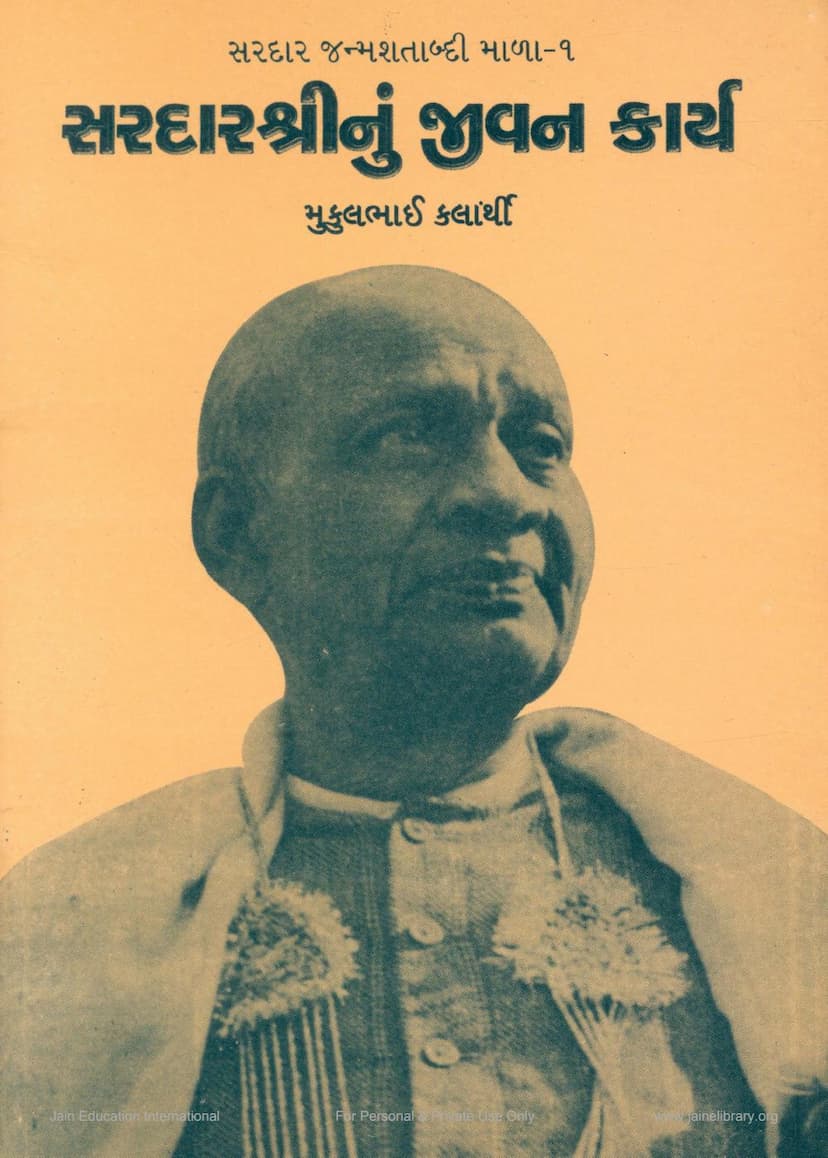Sardar Shreenu Jivan Karya
Added to library: September 2, 2025

Summary
Here's a comprehensive summary of the Jain text "Sardar Shreenu Jivan Karya" by Mukul Kalarthi, based on the provided pages:
Overview:
"Sardar Shreenu Jivan Karya" (The Life and Work of Sardar) is a biographical work detailing the life and contributions of Sardar Vallabhbhai Patel. Published by Navjivan Prakashan Mandir, this book is part of a series dedicated to the Sardar's birth centenary. It aims to introduce the younger generation to the significant achievements and character of this prominent leader of India's independence movement and nation-building.
Key Themes and Content:
The book chronicles Sardar Patel's life, highlighting his journey from humble beginnings to becoming a pivotal figure in Indian history. The summary covers the following aspects as presented in the provided pages:
-
From Humble Beginnings to National Leadership:
- Sardar Patel was born into a poor farming family in Karamsad, Gujarat.
- Despite financial constraints, he harbored a strong desire for education and self-improvement. He pursued studies at home and eventually went to England to become a barrister.
- His early life was marked by self-reliance and a commitment to learning, even undertaking practical work like farming.
-
Parental Influence and Early Character:
- The book emphasizes the sanskar (values and upbringing) received from his parents, Zaverbhai and Ladbai.
- His father, Zaverbhai, was a devout Swaminarayan sect follower, a man of independent spirit and strict nature. The text narrates an interesting anecdote about his father's intelligence being recognized by the Indore ruler.
- His mother, Ladbai, is described as gentle, skilled in household management, and compassionate, traits that likely influenced Sardar Patel's own character.
- Sardar Patel inherited his father's discipline, determination, and his mother's neatness and orderly habits.
-
Educational Journey and Early Leadership:
- Sardar Patel completed his early education in Karamsad and later moved to Nadiad and Petlad for further studies.
- Even as a student, he displayed leadership qualities, standing up against injustice and organizing his peers. An incident where he led a class walkout in protest against a teacher's unfair behavior is highlighted.
- He also demonstrated a knack for problem-solving and organized students for civic activities like municipal election campaigns.
-
Legal Career and Aspiration to Become a Barrister:
- After matriculation, Sardar Patel worked as a District Pleader.
- He pursued his legal education through diligent self-study and saving money.
- The text describes his early legal practice in Godhra and later Borsad, where he quickly gained a reputation for his sharp intellect, fearlessness, and effective advocacy. He commanded respect and was known for his strict adherence to law and justice, even confronting British judges when necessary.
-
Brotherly Bond and Sacrifice:
- A significant portion is dedicated to the deep bond between Sardar Patel and his elder brother, Vithalbhai Patel.
- When Vithalbhai decided to go to England to become a barrister, Sardar Patel supported him by taking on the responsibility of earning and managing the household finances, including sending money to his brother abroad. This demonstrates his selfless nature and commitment to family.
-
Encounter with Mahatma Gandhi:
- The book details Sardar Patel's gradual acquaintance with Mahatma Gandhi. Initially, he was somewhat dismissive of Gandhi's methods.
- However, as he came into contact with Gandhi, he began to appreciate the Mahatma's practical approach to empowering the masses and his unwavering commitment to truth.
- He was deeply impressed by Gandhi's ability to lead people against oppressive foreign rule.
-
Entry into the Freedom Struggle:
- Sardar Patel fully embraced Gandhi's philosophy and joined the Indian independence movement with full commitment.
- His active participation in key movements like the Kheda Satyagraha, the Non-Cooperation Movement, the Civil Disobedience Movement, and the Quit India Movement is noted.
- The Bardoli Satyagraha in 1928 marked a turning point, earning him the title "Sardar" (leader) from the people for his exceptional leadership and courage.
-
Challenges During Imprisonment and Health Issues:
- The text mentions his imprisonment during the freedom struggle, including his time in Ahmednagar Fort.
- During his incarceration, his intestinal ailment worsened, but he often prioritized his national duties over his personal health, a point of concern for Mahatma Gandhi.
-
Post-Independence Responsibilities and Nation Building:
- After India's independence, Sardar Patel served as the Deputy Prime Minister and Home Minister.
- He played a crucial role in integrating over 500 princely states into the Indian Union, a monumental task requiring immense skill, diplomacy, and firmness. This is described as his "unprecedented work."
- The book highlights his compassionate approach in dealing with the princes, winning them over with affection and understanding rather than coercion, thus preventing further fragmentation of the country.
-
Personal Life and Demise:
- The book touches upon personal tragedies, including the passing of his wife, Zaverba, at a young age, which left him a widower with two young children.
- Despite societal pressure and his own grief, he remained unmarried after his wife's death.
- The text concludes with his passing on December 15, 1950, after a prolonged illness, leaving a void in the nation and deeply mourning for the people of Gujarat and India.
Overall Message:
"Sardar Shreenu Jivan Karya" portrays Sardar Vallabhbhai Patel as a man of exceptional character, driven by a strong sense of duty, integrity, and love for his country. It emphasizes his transformation from a simple farmer's son to a towering national leader, highlighting his resilience, courage, and unwavering dedication to serving the people and unifying India. The book serves as an inspirational account for future generations, underscoring the importance of "purushartha" (effort and self-reliance) and selfless service.